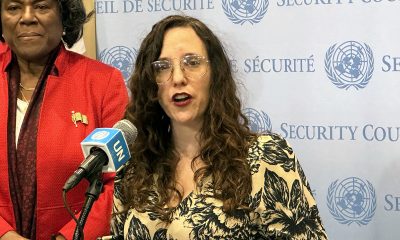World
Russia again seeks to reassure IOC over Olympics
Russian Deputy Prime Minister Dmitry Kozak said everyone welcome at games
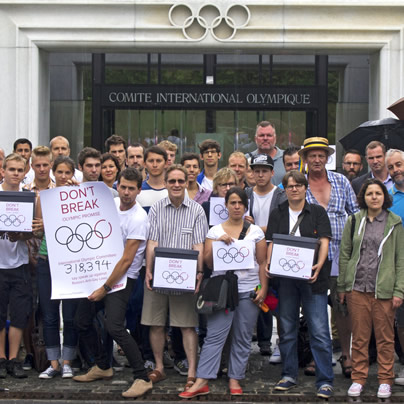
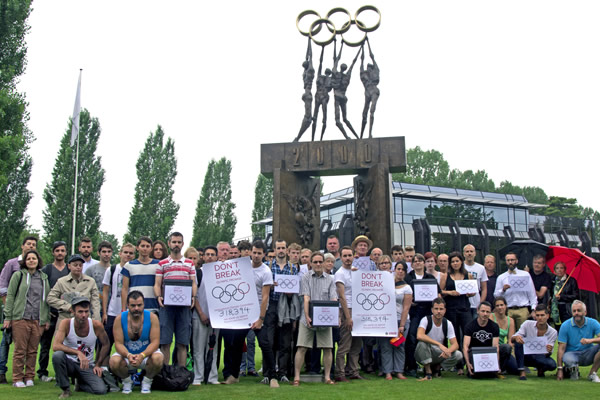
Members of All Out and Athlete Ally on August 7 presented a petition with more than 300,000 signatures to the International Olympic Committee that urges it to pressure Russia to end its gay crackdown. (Photo courtesy of All Out)
The International Olympic Committee on Thursday said it had received additional assurances from the Russian government that gay people would be welcome to attend the 2014 Winter Olympics in Sochi, Russia.
The IOC said in a statement Russian Deputy Prime Minister Dmitry Kozak wrote in a letter to the Olympic body that his country “has committed itself to comply strictly with the provisions of the Olympic Charter and its fundamental principles, according to item 6 of which ‘any form of discrimination with regard to a country or a person on grounds of race, religion, politics, gender or otherwise is incompatible with belonging to the Olympic movement.”
“The Russian Federation guarantees the fulfillment of its obligations before the International Olympic Committee in its entirety,” Kozak added, according to the IOC.
Kozak’s letter to the IOC comes eight days after the Olympic body reiterated to the Washington Blade its previous statements that said it has “received assurances” from the Kremlin the broadly-worded law that President Vladimir Putin signed in June that bans gay propaganda to minors will “not affect those attending or taking part” in the Sochi games.
The Russian Interior Ministry in an August 12 statement said it would enforce the statute during the Olympics. Russian Sports Minister Vitaly Mutko earlier this week again defended the law.
“We want to protect our children whose psyches have not formed from the propaganda of drug use, drunkenness and non-traditional sexual relations,” he told reporters during a Moscow press conference as the Associated Press reported.
Athletes speak out against anti-gay law
Russian chess champion Gary Kasparov and gay playwright Harvey Fierstein are among those who have called for a boycott of the Sochi games that will take place in February. Author Dan Savage, LGBT rights advocate Cleve Jones and others have called for a boycott of Russian vodka.
President Obama, retired tennis champion Martina Navratilova, gay Olympic diver Greg Louganis and several LGBT advocacy groups that include Athlete Ally are among those who feel the U.S. should compete in Sochi.
American runner Nick Symmonds criticized Russia’s gay propaganda ban last week in an interview with the Russian news agency RIA Novosti after he competed in the World Athletic Championships in Moscow. Figure skater Johnny Weir, whose husband is of Russian descent, told CBS News earlier this month he is “not afraid of being arrested” while at the Olympics.
High jumper Emma Green Tregaro and sprinter Mao Hjelmer, who are from Sweden, painted their fingernails in rainbow colors as they competed in the World Athletic Championships. The AP reported Green Tregaro wore red fingernail polish during an August 17 high jump competition at the same event because Swedish athletic officials reportedly asked her to change their color.
Yelena Isinbayeva, a Russian Olympic pole vault champion, defended the gay propaganda law as she criticized Green Tregaro and Hjelmer during an August 15 press conference after she won her third title at the World Athletic Championships. Russian sprinter Kseniya Ryzhova earlier this week dismissed suggestions she and teammate Tatyana Firova challenged the statute when they kissed on the medal podium after they won the women’s 4 x 400 meter rally at the event.
The IOC on August 14 reaffirmed to the Blade it will not allow athletes who compete in Sochi to publicly challenge Russia’s gay propaganda ban. The Olympic Charter states anyone who violates the rule could face potential disqualification or loss of their accreditation to the games, although the IOC it would “always treat cases individually and take a sensible approach depending on what was said or done.”
An IOC spokesperson declined to provide the Blade a copy of the letter it said Kozak wrote to the Olympic body.
The AP reported Kozak wrote in his letter he addressed to French IOC member Jean-Claude Killy the gay propaganda law is about the “restriction of information that promotes non-traditional sexual relationships among children.” The news agency said Kozak further defended the statute.
“These legislations apply equally to all persons, irrespective of their race, religion, gender or sexual orientation and cannot be regarded as discrimination based on sexual orientation,” he reportedly wrote.
Cyd Zeigler, Jr., co-founder of Outsports.com, again criticized the gay propaganda law in response to Kozak’s letter to the IOC.
“The problem with this law has always been interpretation,” Zeigler told the Blade. “It’s the same ‘love the sinner, hate the sin’ mantra we’ve heard so many times before. Russia can say they will welcome anyone, but they won’t allow any action. They won’t allow fans to wave rainbow flags in the streets or hold hands and kiss in public.”
Zeigler also described the IOC as “problematic.”
“Now they’re pressuring national Olympic committees to stop athletes from painting their fingernails in rainbow colors,” he said. “Russia is only part of the problem here, the IOC itself is the other piece.”
Africa
Report: Anti-LGBTQ discrimination has cost East African countries billions
Open for Business highlights Kenya, Uganda, Tanzania, and Rwanda

The economies of four East African countries are losing more than $5 billion a year because of discrimination against LGBTQ people.
The 80-page report that Open for Business, a coalition of leading global organizations that champion LGBTQ inclusion, released in late March focuses on Kenya, Uganda, Tanzania, and Rwanda. It attributes the losses to anti-homosexuality laws, and predicts more economic costs if lawmakers implement other harsh anti-LGBTQ measures.
The report notes Uganda is losing $2.4 billion, or 5.2 percent of its GDP, annually because of the Anti-Homosexuality Act that took effect in 2023. Open for Business last October revealed the country had already lost $1.6 billion in foreign direct investment, donor aid, trade, tourism, public health and productivity after President Yoweri Museveni signed the law.
Kenya is losing $1.5 billion, or 1.38 percent of its GDP.
The report warns that enacting the pending Family Protection Bill would cost the country an additional $6.3 billion, or 5.8 percent of its GDP, annually. Opposition MP Peter Kaluma, who has introduced the measure, in January claimed the Biden-Harris administration had blocked it and vowed to have fellow MPs pass it after U.S. President Donald Trump’s inauguration.
Kaluma is a strong supporter of Trump and the Republican Party’s opposition to LGBTQ rights and other far-right conservative ideologies.
Tanzania is losing $1.1 billion, or 1.33 percent of its GDP, because of anti-LGBTQ discrimination. Rwanda is losing $45 million, or .32 percent of its GDP.
Homosexuality is not illegal in Rwanda unlike the other three countries, but consensual same-sex sexual relationships remain taboo. Queer Rwandans also face stigma, discrimination, social exclusion, and arbitrary detention.
“A series of private member bills in Uganda, Kenya, and Tanzania have threatened to pull the region back in terms of progress and human rights for LGBTQ+ people, and damage both the ease of doing business and their international reputation,” states the Open for Business CEO Dominic Arnall.
Arnall notes his organization’s extensive engagement with businesses across East Africa over the last five years has always linked harmful anti-LGBTQ laws to impacts on a country’s investment prospects.
“The finding lays bare an uncomfortable truth: That laws that harm the LGBTQ+ community are standing in the way of prosperity and growth for all citizens in the region,” he said.
The report calls for LGBTQ inclusion as part of the region’s broader economic development agenda.
The Open for Business report notes anti-gay violence and discrimination in Tanzania has been on the rise since the late-President John Magufuli came to power in 2015. The country’s punitive anti-homosexuality law with a 30-year prison sentence for consensual same-sex sexual relations was already in place, but queer Tanzanians were generally not systematically targeted.
“Reporting of neighbors or community members for suspected homosexuality is frequent and law enforcement officers have been known to pose as members of the LGBTQ+ community to entrap and blackmail LGBTQ+ individuals,” states the report.
It also notes the Tanzanian government’s crackdown on websites and social media accounts that promote LGBTQ rights and threatening the arrests of administrators who allow such content. The report concludes this suppression has caused queer people to live in fear and isolation.
Religious organizations, particularly Christian churches in Tanzania, also champion anti-LGBTQ rhetoric by encouraging their followers against tolerating homosexuality and transgender people. Politicians, meanwhile, use anti-LGBTQ narratives to gain support during campaigns.
While Rwanda stands out as the only East African country in which homosexuality is not criminalized and has foreign donors implementing programs that target the queer community, discussing LGBTQ rights in public is rare and same-sex relationships are not legally recognized. The Open for Business report notes this situation creates legal ambiguity and a fragile social environment for queer Rwandans.
“Several LGBTQ+ rights organizations have emerged in recent years, mostly in Kigali, although they do not always identify themselves as LGBTQ+ associations and are rarely formally registered, making it difficult for them to receive funding,” reads the report.
The Rwandan government has rejected calls to criminalize homosexuality, which it considers a “private matter.” It has also been adamant against efforts to protect queer people for fear of domestic opposition and a desire not to politicize the issue like in neighboring countries.
Kenya, like Rwanda, has for a long time been considered more receptive of queer people, “as long as LGBTQ members are not ‘too loud.’”
Anyone convicted under Kenya’s colonial-era sodomy law could face up to 14 years in prison. Efforts to enact a harsh anti-homosexuality law and anti-LGBTQ protests that religious leaders, politicians, and activists have organized have increased homophobia in the country.
“LGBTQ individuals report significant difficulties in securing formal employment, which pushes many of them into more precarious livelihoods in the informal sector,” states the report.
Trinidad and Tobago
Trinidad and Tobago recriminalizes homosexuality
Court of Appeal on March 25 overturned 2018 ruling

An appeals court in Trinidad and Tobago has recriminalized consensual same-sex sexual relations in the country.
Jason Jones, an LGBTQ activist from Trinidad and Tobago who currently lives in the U.K., in 2017 challenged Sections 13 and 16 of the country’s Sexual Offenses Act. High Court Justice Devindra Rampersad the following year found them unconstitutional.
The country’s government appealed Rampersad’s ruling.
Court of Appeal Justices Nolan Bereaux and Charmaine Pemberton overturned it on March 25. The Daily Express newspaper reported Justice Vasheist Kokaram dissented.
“As an LGBTQ+ citizen of Trinidad and Tobago, this regressive judgement has ripped up my contract as a citizen of T&T and again makes me an unapprehended criminal in the eyes of the law,” said Jones in a statement he posted to social media. “The TT Court of Appeal has effectively put a target on the back of LGBTQIA+ people and made us lower class citizens in our own country.”
Antigua and Barbuda, St. Kitts and Nevis, Barbados, and Dominica are among the countries that have decriminalized consensual same-sex sexual relations in recent years.
The Inter-American Commission on Human Rights in 2021 issued a decision that said Jamaica must repeal its colonial-era sodomy law. The Jamaican Supreme Court in 2023 ruled against a gay man who challenged it.
A judge on St. Vincent and the Grenadines’s top court last year dismissed two cases that challenged the country’s sodomy laws.
Jones in his statement said he “will be exercising my right of appeal and taking this matter to the” Privy Council, an appellate court for British territories that can also consider cases from Commonwealth countries.
King Charles III is not Trinidad and Tobago’s head of the state, but the country remains part of the Commonwealth.
“I hope justice will be done and these heinous discriminatory laws, a legacy of British colonialism, will be removed by the British courts,” said Jones.
United Nations
Trump pulls Elise Stefanik’s UN ambassador nomination
Republicans have slim majority in US House of Representatives

President Donald Trump on Thursday withdrew U.S. Rep. Elise Stefanik (R-N.Y.)’s nomination to become the next U.S. ambassador to the U.N.
The Associated Press noted Trump in a Truth Social post said it was “essential to maintain every Republican seat in Congress.”
Republicans currently have a narrow 218-213 majority in the U.S. House of Representatives. Special elections to fill the seats that National Security Adviser Mike Waltz and former U.S. Rep. Matt Gaetz (R-Fla.) vacated when they joined the Trump-Vance administration and resigned respectively will take place on April 1 in Florida.
“Elise Stefanik is truly a great leader and a devoted patriot,” said House Speaker Mike Johnson (R-La.) in a statement. “Today’s selfless decision shows America what those of us who work with her already know. She is deeply devoted to her country and fully committed to see President Trump’s agenda succeed in Congress.”
“It is well known Republicans have a razor-thin House majority, and Elise’s agreement to withdraw her nomination will allow us to keep one of the toughest, most resolute members of our conference in place to help drive forward President Trump’s America First policies,” he added. “There is no doubt she would have served with distinction as our ambassador to the United Nations, but we are grateful for her willingness to sacrifice that position and remain in Congress to help us save the country.”
Stefanik, 40, has represented New York’s 21st Congressional District since 2015. She later became chair of the House Republican Conference.
Stefanik in 2019 voted for the Equality Act, but she opposed it in 2021. Stefanik in 2022 is among the dozens of Republicans who voted for the Respect for Marriage Act that then-President Joe Biden signed.
Stefanik, among other things, has also been outspoken against antisemitism on college campuses.
Trump has not said who he will nominate to become U.N. ambassador. Johnson in his statement said he will “invite her to return to the leadership table” of the House Republican Conference “immediately.”
-
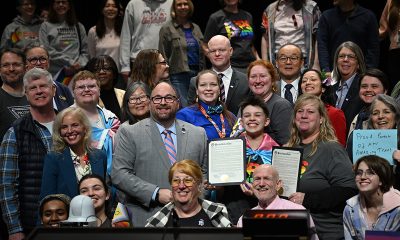
 Virginia5 days ago
Virginia5 days agoFairfax County School Board issues Trans Day of Visibility proclamation
-

 Trinidad and Tobago5 days ago
Trinidad and Tobago5 days agoTrinidad and Tobago recriminalizes homosexuality
-
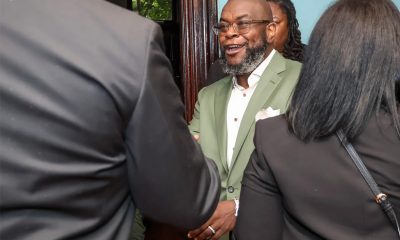
 National2 days ago
National2 days agoDestination Tomorrow works to empower LGBTQ community
-

 Maryland1 day ago
Maryland1 day agoAt transgender visibility celebration, Moore called out for lack of action





